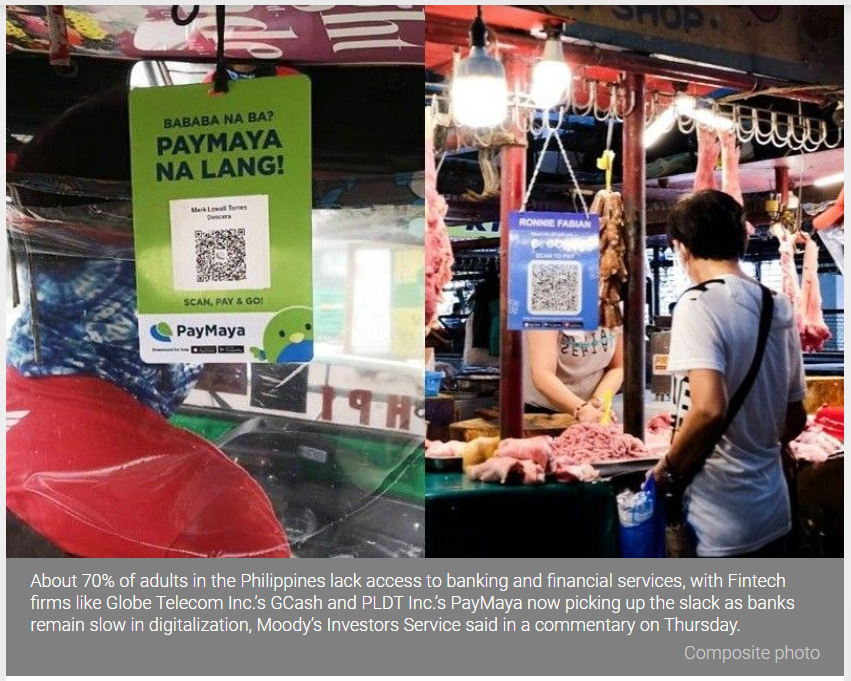Fintech firms to overtake banks in cornering unbanked Filipinos — Moody’s
MANILA, Philippines — Fintech companies are poised to overtake banks in capturing unbanked Filipinos, likely leading to missed opportunities for conventional lenders to attract new customers and create fresh sources of revenue.
About 70% of adults in the Philippines lack access to banking and financial services, with Fintech firms like Globe Telecom Inc.’s GCash and PLDT Inc.’s PayMaya now picking up the slack as banks remain slow in digitalization, Moody’s Investors Service said in a commentary on Thursday.
This means Fintech companies are well-positioned to overtake banks in key areas of their retail business, such as depository services, credit cards, remittances and unsecured lending. As it is, Moody’s believes it is now “challenging” for banks to win market share in the retail segment over fintech companies.
“Already, the penetration of mobile wallets has exceeded that of bank accounts as fintech companies use digital payments to gain a foothold in the Philippine financial system,” the global debt watcher said.
“Competitiveness in the retail segment is critical for Philippine banks given its huge growth potential,” it added.
Moody’s saud there’s an “abundant room” for growth for fintech companies, such as providers of mobile wallet applications, in the Philippines. World Bank data showed the country is the fourth-largest recipient of inbound remittances in the world, with money sent home by Filipinos overseas accounting for 8.3% of gross domestic product last year. Banks and money transfer companies rake in about $1.4 billion in fees annually from these transactions, which corners a substantial share of lenders’ non-interest income.
At the same time, contagion fears amid the coronavirus pandemic made fintech companies even more popular among Filipinos. Central bank data showed the number of active electronic money wallets in the Philippines increased 61% year-on-year in the first nine months of 2020. Meanwhile, total value of transactions on GCash, one of the top mobile wallet services in the country, grew a staggering 254% annually to $20 billion last year.
For this year, GCash targets gross transaction value to double to P2 trillion “driven by the heightened need for cashless solutions.”
But Moody’s said banks seemed unfazed by the threats posed by fintech companies, as lender’s investment in digitization has so far been largely limited to upgrading internet banking platforms to serve existing clients, which are mostly corporates.
There’s a rhyme or reason to this. Banks have been reluctant to grow their retail loans portfolio because, unlike companies, retail borrowers are more at risk of defaulting on their loans during hard times. But amid a weak credit demand from pandemic-battered companies, Moody’s said retail loans are more profitable than corporate loans now, an opportunity that conventional banks are clearly missing out.
One way for banks to make some headway digital competitiveness is to acquire existing fintech companies, but Moody’s said doing so would be difficult since incumbent fintech players already have strong venture capital backing. Just recently, Voyager Innovations, the operator of Paymaya, raised $167 million in funding to launch a digital bank.
“A failure to respond quickly to the emergence of fintech companies will make it more difficult for Philippines banks to acquire new customers and create new revenue sources, especially from the large unbanked population,” Moody’s said.
Source: https://www.philstar.com/business/2021/07/15/2112718/fintech-firms-overtake-banks-cornering-unbanked-filipinos-moodys


 Thailand
Thailand




